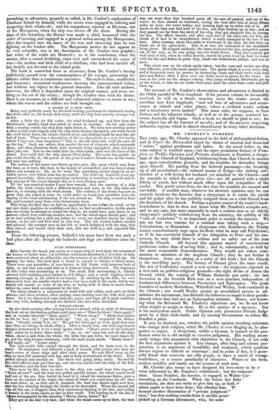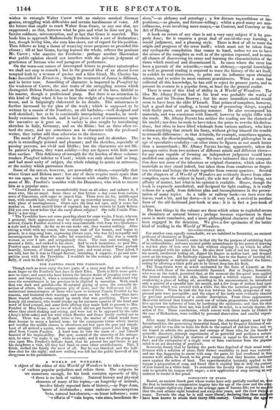MR. CHORLEY'S POMFRET.
TEN years ago, Mr. Chorley appeared in the field of philosophical fiction, and in Conti the Discarded urged the claims of musical and theatrical " artists " against gentlemen and ladies. In the novel before us the same subject is touched upon' but the more prominent feature of Pom- fret, or Public Opinion and Private Judgment, is Pomfret, a clergy- man of the Church of England, withdrawing from that Church in mature age, upon conscientious grounds, and the troubles he thereafter brings upon himself. The parting from the beloved parsonage—the breaking up of old associations—the reduced means of living—the sinking sub- mission of a wife loving her husband yet attached to the Church—and the scandals to which the act gives rise—are all painted with a slight felicity of touch, but without much effect upon the sympathies of the reader. This partly arises from the fact that the troubles are natural amid inevitable. A sensible man, whatever his abstract opinions may be, can scarcely inculcate the doctrine that a clergyman is to retain his parish and his pulpit after he has publicly resigned them on a vital dissent from the doctrines of his church. Perhaps a greater source of the reader's hard- heartedness is, that he does not know what Mr. Pomfret's scruples are; and in any case, but more especially in such a serious case as an elderly clergyman's publicly withdrawing from the ministry, the validity of the "case of conscience' is an important point to sustain the interest. We can see but two reasons for a rational man taking such a step,— Unitarianism, or Romanism. A clergyman who disbelieves the Trinity cannot conscientiously urge upon his flock what he may call Polytheism ; or if he has convinced himself of the delegation to Peter and his suc- cessors, he may think there is schism and no safety out of the true Catholic Church. All beyond this appears matter of conscientious preference rather than of saving faith ; and is, substantially, so held by the more respectable Nonconformists. They would not refuse com- munion to members of the Anglican Church ; they do not decline it themselves. Some are aiming at a unity of this kind ; but the Church is the unwilling party. The history of Dissent gives the same result. The Act of Uniformity created a new system : the nonjurors objected to a new oath on politico-religious grounds—the right divine of James the Second, which the coming of William distinctly put aside : the late Secession in the Scottish Kirk was on a nem question, independent of fundamental differences between Presbytery and Episcopacy. The great founders of modern Methodism, Whitefield and Wesley, both continued ha the Church ; nor would Wesley permit an unordained person to ad- minister the sacraments, but directed his followers to repair to their parish- church when they had not an Episcopalian minister. Hence, not know. ing what the Reverend Mr. Pomfret's objections are, we do not know what weight to assign to them. He is the martyr of a mystery. Nor is his martyrdom much. Public Opinion only persecutes Private Judg- ment by a little tittle-tattle, and by causing Government to refuse Mr. Pomfret a place.
It may be doubted, too, whether the public opinion touching ministers who change their religion, which Mr. Chorley is ever flinging at, be alto- gether so unjust. A clergyman, unlike a layman, is trained to his pro- fession when he is old enough to exercise judgment. His reading neces- sarily brings him acquainted with objections to the Church, if not with the best arguments against it. Any change, after long and solemn pre- paration, is an argument of instability and weakness, which qualities always expose to ridicule or contempt : and in point of fact, it is gene- rally found that converts are silly people, or have a touch of wrong- headedness or a coarse peculiarity of character. Whatever the form, restless mobility and vanity are the essence of such men. Mr. Chorley also seems to have designed his love-story to be a, what influenced by Mr. Pomfret's withdrawal ; but the connexie.
clear. Grace Pomfret, the heroine, is engaged to Walter Car,
travelling on the Continent. When she learns her fathe
resolutions, she does not -write to give him up, as both st
admit ought to have been done; but clinches him. Ti- deemed another illustration of "private judgment" nion," but that nothing results from it on this grow' picked up a German adventurer, who, for some
wishes to entangle Walter Carew with an embryo musical German genius, struggling with difficulties and certain harshnesses of voice. All the letters that ought to reach Walter from Grace, or any one else, are suppressed ; so that, between what he gets and what he does not get, he fancies coldness, misconception, and at last that Grace is married. This leads him to approach Mademoiselle Porzheim with a sort of declaration ; but, though loving him, she cuts him short, out of regard for his position. Then follows as long a tissue of wearying cross purposes as preceded this climax ; till at last Grace, having learned the whole, refuses the penitent Mr. Carew ; who marries the Porzheirn : perhaps another illustration that public opinion should not interfere with the private judgment of gentlemen of fortune who wed paragons of performers.
On the worn-out nature of intercepted letters to produce catastrophes we shall not stop to remark ; but in the general idea of an absent lover tempted both by a woman of genius and a false friend, Mr. Chorley has been forestalled in Ernstein ; though the treatment of James is different, and in better tone. Something of character is imparted in Pomfret by the weakness of Carew, the nice traits of the struggling actress which distinguish Helena Porzheim, and an Italian valet of the hero, faithful to his master, though a professional pimp. But there is no attraction in this kind Of thing when it has to bear the weight of a long-sustained in- terest, and is fatiguingly elaborated in its details. This minuteness is further increased by the plan of the work ; which is supposed to be written by a cousin of the Pomfrets, an old bachelor,—well designed and well sketched ; but as he is continually interpolating remarks, he need- lessly extenuates the book, and in fact gives a sort of commentary upon the narrative as it goes on. A variety is also sought by introducing sketches in Italy, Germany, and on the Rhine : but as these often re- tard the story, and are sometimes not in character with the professed writer, they rather add than otherwise to the slowness.
The merit of Pon:fret consists in its writing and its sketches. The style is exceedingly pointed and pleasant; and the sketches, especially of passing persons, are vivid and lifelike ; but the characters are not life. In painter's phrase, they want solidity—they are figures with little more than surface. This deficiency of strength for the burden of three volumes renders Pomfret inferior to Conti; which was only about half as long, and had more unity of subject, the whole relating to actors or actresses, or the society which patronizes them.
Some of the scenes, however, are powerfully written,—especially that where Grace and Helena meet : but any of these require more space than we can spare, so that we must be content with smaller bits. Here are some of Mr. Pornfret's troubles with the Dissenters, who wish to secure him as a popular man.
"Cousin Pomfret is most uncomfortably beset on all sides; and endures it, I must own, like an angel. Some three or four letters a day come from various sorts of Dissenters, each eager to snatch him. There were six fat, middle-aged men, with smooth hair, waiting till he got up yesterday morning, from Leeds, with plans of meetinghouses. Grace says she does not care, only it vexes her mother so. A most uncivil letter of reproach has been written by Lady Kelsea. Did you ever know before that she cared about religion? She calls Cousin Porn- fret's 'a low step.' "The Tyrwhitts have not come prowling about for some weeks, I hear; whence, I presume, their appearance may be shortly expected. The morning after I arrived, Cousin Pomfret received a very unaccountable visit from two Quakers— male and a female. As far as we can make out, they wanted nothing. After sitting a while with my cousin, the woman took off her bonnet, and began to preach, in a sing-song tone, expressing (Grace says, who was by) sympathy and encouragement for those who suffer for conscience' sake. She was a comely woman as ever I saw, and scrupulously clean. The man said nothing, but moaned a little, and rocked in his chair. And to such incursions, as poor Mrs. Pomfret says, must they now be exposed. The Quakers declined wine; partook heartily, however, of bread and raspberry jam; and went away. They asked, I am told, how far it was to Chapel Barton; intending, I suppose, to go and sym- pathize next with the Tyrwhitts. I wouldn't be the woman's plain cap near &,11y, if such be their object."
THE PARTING FROM THE PARSONAGE.
Though such as most enjoy the love parts of a story may find me tedious, I must linger on the Pomfrets' last days in their Eden. There is little more quiet- ness to come; and some who have known the intense desire of grasping every mo- ment and improving it, when a momentous change is near, will understand why even the remembrance is too 'precious to be slighted in narration. With much that was dark and painful—the ill-natured prying of some, the cowardly de- sertion of others, the contemptuous pity of more, and the well-meant but ill- understood remonstrances of those who came to torment Cousin Pomfret for his reasons, and bestowed their warnings and omens on his wife' rather than have them wasted utterly—was mixed up much that was gratifying. There were homely old creatures, who would trudge up for one more squeeze of the hand and word of kind counsel, and some little offering they made bold to present to Mrs. Pomfret or Miss Grace; one or two of whom did not get further than the gate, where they stood shaking and crying, and were not to be appeased by the cake (Amy's bride-cake) and hot wine which Harriet and Grace busily carried out to them. There was an ill-spelt letter or two, the matter of which would have done honour to many a learned man; for the courageous virtue which shocks and terrifies the middle classes is oftentimes not lost upon the poor and simple. Last of all arrived a squire, whom some unhappy tithe-quarrel had long kept aloof from Cousin Pomfret. A hard man he bore the name of ; and himself boasted of his implacability. But now, assured of the sincerity of his antago- nist, became "to make it up," while he could; and it was with the grasp of a vice upon Mrs. Pomfret's delicate hand, that he pressed her and Grace to pay his daughters a visit, till they had fixed on some other establishment. This, I think, melted the family the most of all. But he was thanked, and the hall- door shut for the night; and now nothing was left but the public farewell of the clergyman to his parishioners.



























 Previous page
Previous page